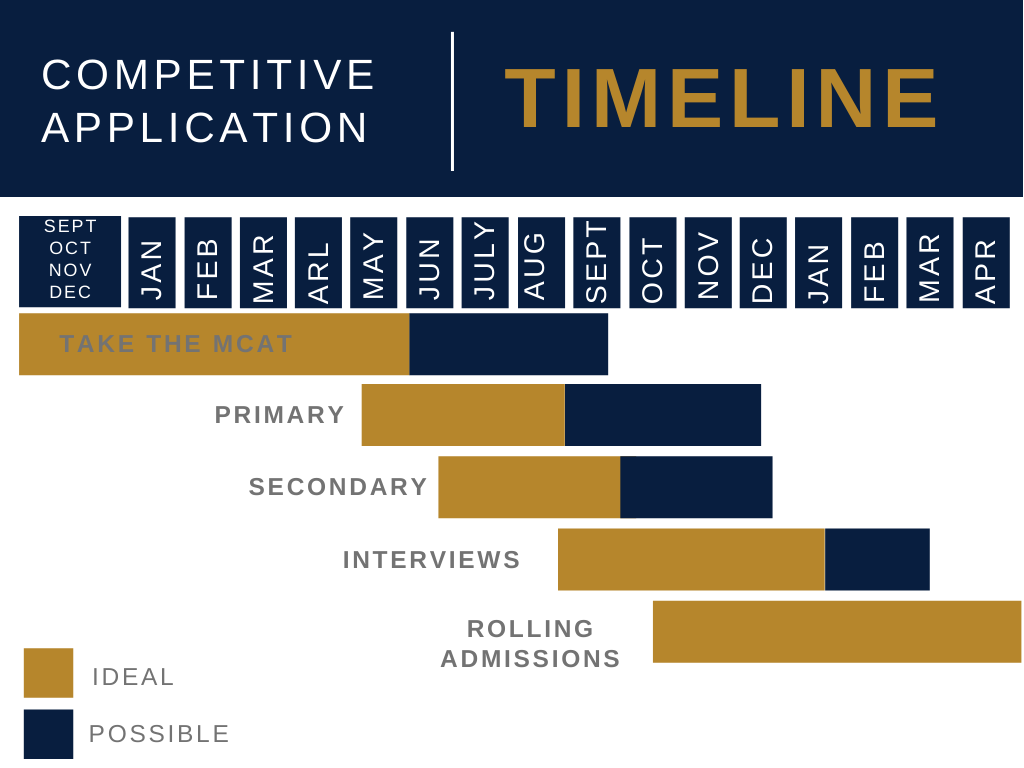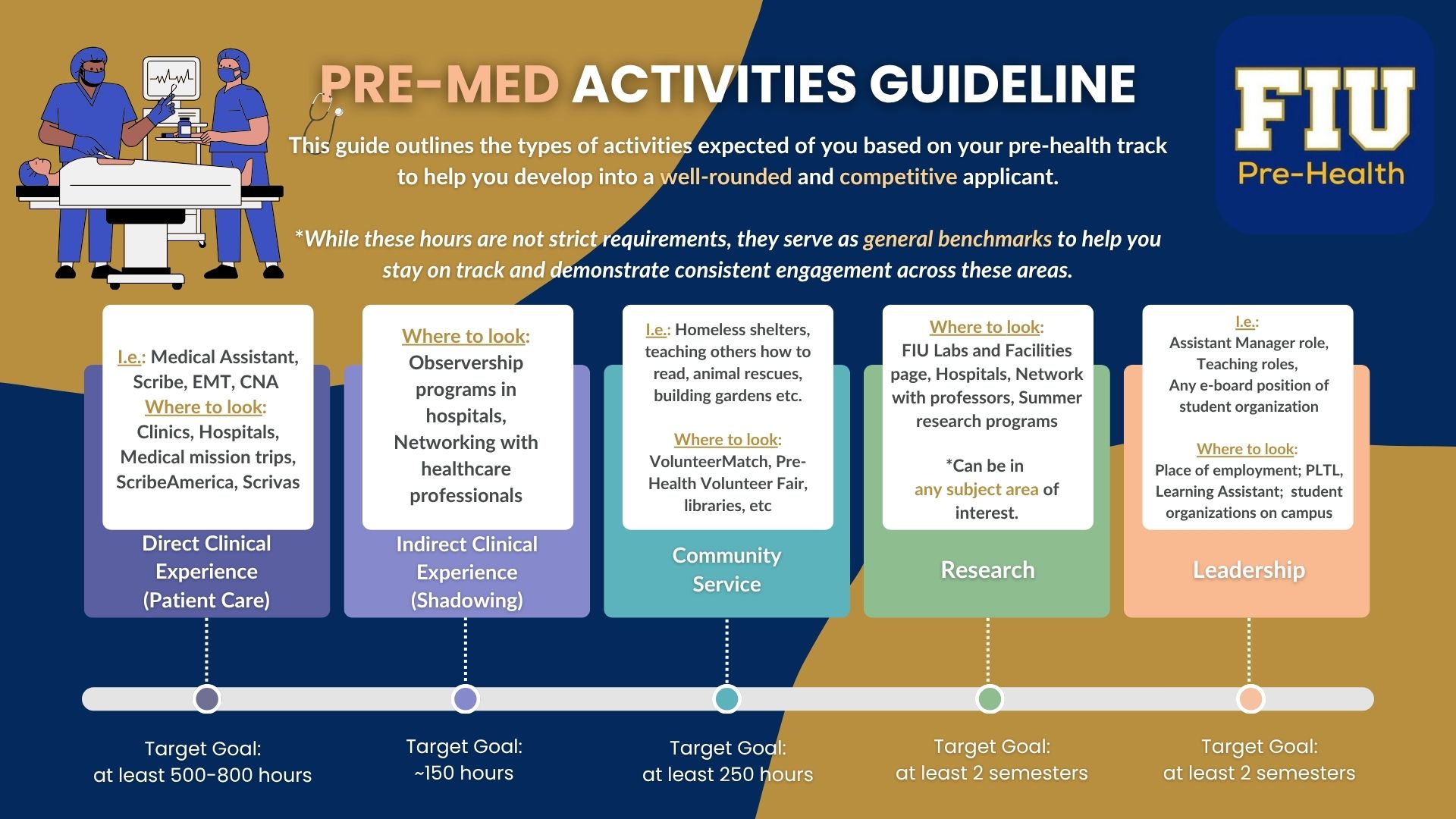Admission requirements include a bachelor's degree from an accredited U.S. college or university, the following prerequsities:
- Two semesters of general Biology and lab
- Two semesters of general Chemistry and lab
- Two semesters of Organic Chemistry and lab
- Two semesters of Physics and lab
- Biochemistry
- Two semesters of Math
- Two semesters of English
Recommended courses:- Genetics
- Cell Biology
- Physiology
- Two semesters of psychology & sociology
For more detailed information, review our Pre-Medical Prerequisite guide.
It is a student's responsibility to check with individual programs regarding the coursework needed to matriculate at their institution.
Being a competitive applicant:
Students completing applications for Allopathic Colleges of Medicine (MD) programs in the United States are generally competitive only if they maintain a GPA (in the sciences and all other areas) above 3.5. Some foreign medical schools offering the MD are fully recognized within the U.S., particularly some Caribbean schools; students may successfully seek admission to one of these schools with a GPA that is somewhat lower than that required by U.S. colleges or schools of medicine.
The academic admission requirements for Osteopathic Colleges of Medicine (DO) span a wider range than those for U.S. MD programs. As the number of high-quality applicants has increased, so have the average admission scores and grades for U.S. Colleges of Osteopathic Medicine.
If you are an international applicant we encourage you to check with individual medical colleges on specific admissions requirements.
Application cycle information:
With the medical school application process taking one full year, students are highly encouraged to think about their application timeline in advance:

* Note: Additional requirements might be needed: CASPer & Situational Judgement Test (SJT)
It is the responsibility of the student to review all program requirements.

Part of your pre-medical journey will be to cultivate knowledge of your future profession, develop proficiency in various skills, and demonstrate a compassionate approach to medical care. The application will ask you to describe 15 experiences that showcase your unique path towards medicine.
These experiences can be broken down into the following categories:
| Artistic Endeavors | Honors/Awards/Recognitions | Non-Medical Paid Employment |
| Medical Community Service | Intercollegiate Athletics | Physician Shadowing/Clinical Observation |
| Non-Medical Community Service | Leadership | Presentations/Posters |
| Conferences Attended | Military Service | Publications |
| Extracurricular Activities | Other | Research/Lab |
| Hobbies | Medical Paid Employment | Teaching/Tutoring/Teaching Assistant |
Check out our OPHA Extracurricular Resource Guide
FIU organizations that may provide resources or networking opportunities to find experience in the above topic areas:
For an extensive list, please refer to Panther Connect.
Other resources:
All applicants must take the Medical College Admission Test (MCAT) to be considered for admission.
What is the MCAT?
The MCAT is a standardized multiple-choice exam created to help medical school admissions offices assess your problem solving, critical thinking, and knowledge of natural, behavioral, and social science concepts and principles prerequisite to the study of medicine. It contains four sections (chemistry/physics; critical analysis and reasoning (CARS); biology/biochemistry; and psychology/sociology).
The MCAT is approximately 8 hours in length. Students receive their score report about a month after they have taken the exam.
When should you take the MCAT to be considered competitive?
Based on whether or not you want to take a growth year, the ideal timeline to take your MCAT should be:
- Straight through: spring semester of junior year
- One-growth year: summer of junior to senior year
- Two growth years: summer after senior year
- Multiple growth years: no earlier than 2 years before application
Students are highly encouraged to have an MCAT score report prior to starting the application process. Not having a score report will put students at a disadvantage when applying since their application will not be considered complete.
Test Preparation
The MCAT is an exam most pre-meds dread the day they have to begin studying for. However, our office is trying to make this process as easy and accessible to students as possible. There are many components to the exam and we hope to provide you with all the information in one place. To find out more about what the MCAT is and the structure of the exam please click here.
Prospective medical students are encouraged to apply to different types of medical schools:
Allopathic (MD) Programs: The Doctor of Medicine is the predominant degree granted by medical schools in the United States.
- MD students apply to Colleges of Allopathic Medicine:
Osteopathic (DO) Programs: The Doctor of Osteopathy is a widely recognized degree granted by medical schools in the United States. Admission requirements include a bachelor's degree from an accredited U.S. college or university, with a curriculum including introductory courses in chemistry, biology, physics and mathematics. Osteopathic physicians with a DO degree have identical privileges to allopathic (MD) physicians, including the opportunity to specialize, in Florida and most other states. The DO is not recognized in all foreign countries.
- DO students apply to Colleges of Osteopathic Medicine:
(Note that, if you’re applying to medical schools in Texas, you’ll need to submit those applications through the Texas Medical & Dental Schools Application Service (TMDSAS), which has its own timeline.)
Application preparation resources:
We encourage students to refer to our FIU OPHA Canvas course to begin working on a preliminary version of their primary application. By working on the canvas course early, students can build on experiences and finish all requirements in the year they apply to professional programs.
Starting a File:
- Need to open a new FIU OPHA Canvas Course account?

